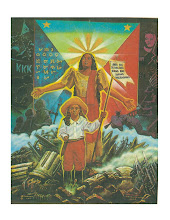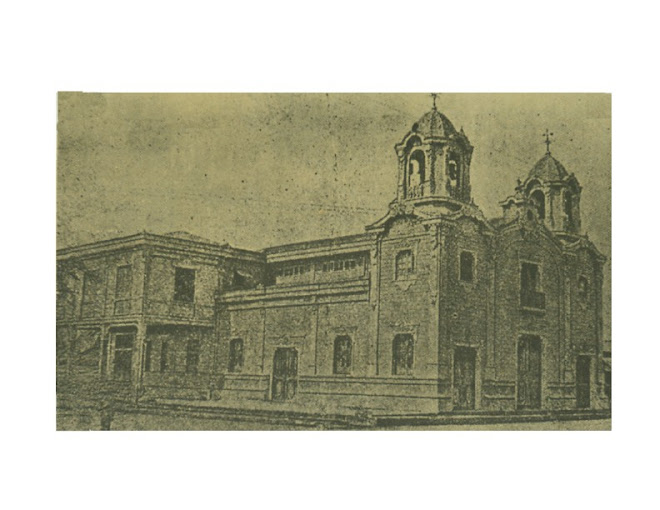INTRODUCTION
The Articles of Religion are doctrinal statements that define the standards of doctrine of the Iglesia Filipina Independiente. It contains the basic summary of the doctrinal teachings subscribed to by the clergy and laity of the Church.
WE HOLD TO THE FOLLOWING ARTICLES OF RELIGION TAUGHT BY THIS CHURCH:
1. Salvation:
Salvation is obtained only through a vital faith in Jesus Christ, the Son of God, as Lord and Saviour. This faith should manifest itself in good works.
2. Holy Scriptures:
The Holy Scriptures contain all things necessary to salvation, and nothing which cannot be proved thereby should be required to be believed.
3. The Creeds:
The Articles of the Christian Faith as contained in the ancient Creeds known as the Apostles’ and Nicene Creeds are to be taught by this Church and accepted by the faithful.
4. The Sacraments:
The Sacraments are outward and visible signs of our faith and a means whereby God manifests His goodwill towards us and confers grace upon us.
Two Sacraments, Baptism and Holy Communion, commonly called the Mass, ordained by Christ Himself, are held to be generally necessary to salvation.
Baptism is necessary for salvation. It signifies and confers grace, cleansing from original sin as well as actual sin previously committed; makes us children of God and heirs of everlasting life. It effects our entrance into the Church of God. It is administered with water in the Name of the Father, the Son, and the Holy Ghost.
Confirmation, whereby, through the imposition of the Bishop’s hands, anointing and prayer, baptized Christians are strengthened by the gifts of the Holy Spirit and confirmed in the Faith.
Penance, the confession of sins as commanded by Jesus Christ.
The Holy Eucharist, the sacrament of the Body and Blood of Christ, taken and received by the faithful for the strengthening and refreshing of their bodies and souls.
Holy Unction, whereby the sick, especially one in danger of death, is anointed with oil with prayer. He receives, if necessary, remission of sins, the strengthening of his soul, and, if it be God’s will, restoration to health.
Holy orders, a Sacrament by which Bishops, Priests and Deacons are ordained and receive power and authority to perform their sacred duties.
Holy Matrimony, a sacrament in which a man and a woman are joined together in the holy estate of matrimony.
5. The Holy Eucharist:
The Holy Eucharist, commonly called the Mass, is the central act of Christian worship. It is the sacrament of our redemption by Christ’s death. Those who partake of it receive the Body and Blood of Christ. All who purpose to make their communion should diligently try and examine themselves before they presume to eat of that Bread and drink of that Cup. For as the benefit is great, if with a true penitent heart and lively faith a man receive that Holy Sacrament, so is the danger great if he receive the same unworthily.
The Mass is to be said in the official language of the Church in such a way it can be heard by the worshipers.
The authorized Order for the celebration of the Mass is that set forth in the Prayer Book adopted by this Church.
6. Sacred Ministry:
From Apostolic times there have been three Orders of Ministers in the Church of God: Bishops, Priests and Deacons. These orders are to be reverently esteemed and continued in this Church. And no man is to be accepted as a lawful Bishop, Priest, or Deacon in this Church, or permitted to execute any functions pertaining to these Orders, except he be called, tried, examined, and admitted thereunto according to the Canons of this Church, and in accordance with the Order prescribed by this Church for making, Ordaining and Consecrating Bishops, Priests and Deacons, or hath had Episcopal Consecration or Ordination.
7. Celibacy of the Clergy:
Bishops, Priests, and Deacons are not commanded by God’s law to marry to abstain from marriage, therefore they are permitted to marry at their own discretion, as they shall judge the same to serve better to godliness.
8. Church Building:
Churches for the worship of God are to be erected and separated from all unhallowed, worldly, and common uses, that men may reverence the Majesty of God and show forth greater devotion and humility in His service.
9. The Altar:
The altar is the most sacred part of the Church because there Jesus is sacramentally present. It symbolizes Mt. Calvary, and, therefore, if images of Saints are used for adornment, care is to be exercised that such ornaments may not distract the minds of the worshipers from the Person of Jesus Christ.
10. Worship, Rites and Ceremonies:
Only such Orders of Service as have been authorized by this Church shall be used in Public Worship; provided, however, that the Diocesan Bishop or Supreme Council of Bishops may authorize Orders of Service for special occasions.
11. Language of Public Service:
All public services shall be conducted in the official language of the Church, or in any other language the Supreme Council of Bishops may prescribe.
12. Purity of Life:
Holiness, altruism, obedience to God’s Commandments and a zeal for His honor and glory are incumbent upon Clergy and Laity alike, therefore all should be trained in a clean and disciplined life, not neglecting prayer, study, and the exercise of moral discipline.
13. Knowledge:
All truth is of God, therefore the Church should promote sound knowledge and good learning. No books except those detrimental to good morals are to be prohibited.
14. The Blessed Virgin:
The Virgin Mary was chosen by God to be the Mother of Jesus Christ. As Jesus Christ is truly God and Mary is the Mother of Jesus Christ, she is the Mother of God in His human generation. She whom God honored is to be honored above all.
15. The Saints:
Persons universally recognized for their holiness of life, loyalty and courage, especially the Blessed Virgin and the New Testament Saints, are to be held in reverent remembrance. Veneration of Saints is not contrary to God’s commandments as revealed in the Scriptures; but their deification is condemned by the Church as a monstrous blasphemy. Veneration of the Saints must not obscure the duty of the faithful to direct approach to God through Jesus Christ. Honor rendered the Saints must in no wise detract from the honor due the Three Persons of the Holy Trinity.
16. Miracles:
Holy Scriptures teach us that events take place in the natural world, but out of its established order, which are possible only through the intervention of divine power, like the Incarnation of Jesus Christ. So-called miracles, based not on well-authenticated facts but on merely fantastic rumors, are repudiated. Belief in unsubstantiated miracles leads to pagan fanaticism and is to be condemned as destructive to the true faith.
17. Attitude Towards The Roman Church:
When this Church withdrew from the Roman Catholic Church, it repudiated the authority of the Pope and such doctrines, customs and practices as were inconsistent with the Word of God, sound learning and a good conscience. It had no intention of departing from Catholic doctrine, practice and discipline as set forth by the Councils of the undivided Church. Such departures as occurred were due to the exigencies of the times, and are to be corrected by official action as opportunity affords, so that this Church may be brought into the stream of historic Christianity and be universally acknowledge as a true branch of the Catholic Church.
18. Attitude Towards Other Churches:
Opportunity is to be sought for closer cooperation with other branches of the Catholic Church, and cordial relations maintained with all who acknowledge Jesus Christ as Lord and Saviour.
19. Church and State:
This Church is politically independent of the State, and the State of the Church. The Church does not ally itself with any particular school of political thought or with any political party. Its members are politically free and are urged to be exemplary citizens and to use their influence for the prosperity and welfare of the State.
20. Doctrine and Constitutional Rules of the Church and the Fundamental Epistles:
The Doctrine and Constitutional Rules of the Philippine Independent Church, adopted on October 28th, 1903, and subsequently amended, and the Fundamental Epistles of the Philippine Independent Church, are henceforth not to be held as binding either upon the Clergy or Laity of this Church in matters of Doctrine, Discipline or Order, wherein they differ in substance from the Declaration of Faith or the Articles of Religion contained herein. They are to be valued as historical documents promulgated by the Founders of this Church when they were seeking to interpret the Catholic Faith in a manner understood by the people. Under the inspiration of the Holy Spirit the Church has sought to eradicate such errors of judgment and doctrine as crept into its life and official documents in times past.
21. Additions, Amendments, Repeal:
The Declaration of Faith shall not be altered, amended or repealed. However, the Articles of Religion may be amended, repealed or added to by an absolute majority of the delegates to the General Assembly having the right to vote. Such action before it becomes binding upon the Church must be ratified by the Supreme Council of Bishops and approved by the Supreme Bishop.
For a more comprehensive presentation about the IFI, please visit http://www.ifi.ph/.
Wednesday, May 6, 2009
Subscribe to:
Post Comments (Atom)





No comments:
Post a Comment